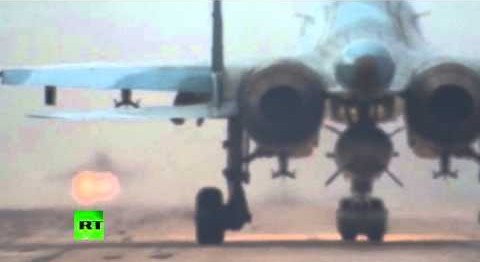PHOTO: Russian State TV image of first warplanes leaving Syria
LATEST
The Obama Administration has cautiously welcomed President Vladimir Putin’s announcement of a withdrawal of most Russian forces from Syria.
White House Press Secretary Josh Earnest said on Tuesday:
The Russia military intervention propped up Assad and only made it more difficult for that political resolution to be reached.
If they continue to follow through, then that would be a positive outcome.
Unnamed administration officials told journalists that they needed further evidence of withdrawal to conclude that Putin was genuine. On Tuesday, the Pentagon said the American military had seen fewer than 10 warplanes depart from Russia’s base in western Syria and no significant troop movements.
Putin surprisingly announced the withdrawal on Monday in a televised conference, saying, “Our goals have generally been fulfilled.”
The statement appeared to have surprised the Assad regime, even though it put out a belated declaration that Putin had “coordinated” the move with President Assad in a phone call.
Earnest said the United States had no “direct advance notice” of the withdrawal. A senior administration official added that there was no “strategic grand bargain” between Washington and Moscow.
Russian State TV showed the first group of withdrawn planes arriving at Voronezh in western Russia on Tuesday, with pilots and other personnel greeted by families and friends.
Meanwhile, some of the remaining warplanes reportedly attacked the Islamic State in support of an offensive by Hezbollah and the Syrian military on Palmyra, the Roman-era city captured by ISIS last May.
Reports: Rebel Commander Detained in Turkey
The commander of a leading rebel faction based in Aleppo has been detained in Turkey, according to pro-opposition media.
The site Enab Baladi reported on Wednesday that Turkish authorities arrested the general commander of the Nour al-Din al-Zenki Movement, Mohammad Said Masri, at Istanbul’s Ataturk International Airport as he was trying to fly out of the country.
A “well-informed source” said Masri has been held in an Istanbul prison since March 11.
The pro-rebel site said that there is foreign pressure on Nour al-Din al-Zenki to disband, and that Masri had fallen out of favor with the Syrian Muslim Brotherhood.
In January, the Movement withdrew from checkpoints in Aleppo city, reportedly after support was cut to it.
A spokesperson said, “Not one bullet has reached the movement for over eight months.”
The rebel group had reportedly been financed and armed by the Turkey-based Military Operation Center that is overseen by the US Central Intelligence Agency.
Kurds Say They Will Announce A Federal System
Officials of the autonomous administration of Syrian Kurdistan (Rojava) in northern Syria are holding a conference to announce a federal system, a Kurdish official said on Wednesday.
Aldar Khalil, head of the Democratic Society Movement (TEV-DEM), said the conference believes federalism is the best solution for halting the ongoing conflict.
Russian officials have spoken of a federal alternative, but the idea has been rejected by both the Assad regime and its other main ally, Iran.
Another official echoed Khalil’s statement. Idris Nassan, an official in the Foreign Affairs Directorate of the Kurdish canton of Kobane, said the announcement will mean “widening the framework of self-administration which the Kurds and others have formed”.
Nassan said the areas will be renamed the Federation of Northern Syria.
On Tuesday, the co-chair of the Syrian Kurdish Democratic Union Party (PYD), Saleh Muslim, told Reuters, “We have said [repeatedly] that we want a decentralized Syria—call it administrations, call it federalism—everything is possible.”
The opposition-rebel bloc have also been sceptical of the proposal. Coordinator Riad Hijab said:
Any mention of this federalism or something which might present a direction for dividing Syria is not acceptable at all.
We have agreed that we will expand a non-central government in a future Syria, but not federalism or division.
A Turkish Foreign Ministry official summarized Ankara’s objections, “Syria’s national unity and territorial integrity is fundamental for us. Outside of this, unilateral decisions cannot have validity.”

